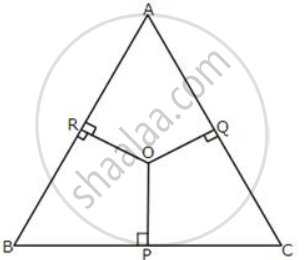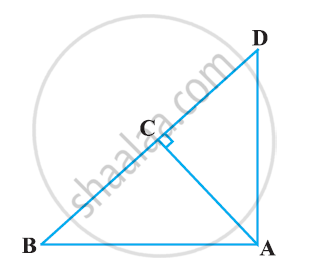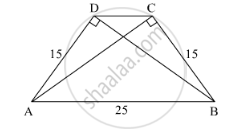Advertisements
Advertisements
प्रश्न
In the following figure, OP, OQ, and OR are drawn perpendiculars to the sides BC, CA and AB respectively of triangle ABC.
Prove that: AR2 + BP2 + CQ2 = AQ2 + CP2 + BR2

उत्तर
Here, we first need to join OA, OB, and OC after which the figure becomes as follows,
Pythagoras theorem states that in a right-angled triangle, the square on the hypotenuse is equal to the sum of the squares on the remaining two sides. First, we consider the ΔARO and applying Pythagoras theorem we get,
AQ2 = AR2 + OR2
AR2 = AQ2 - OR2 ...(i)
Similarly, from triangles, BPO, COQ, AOQ, CPO, and BRO we get the following results,
BP2 = BO2 - OP2 ...(ii)
CQ2 = OC2 - OQ2 ...(iii)
AQ2 = AO2 - OQ2 ...(iv)
CP2 = OC2 - OP2 ...(v)
BR2 = OB2 - OR2 ...(vi)
Adding (i), (ii) and (iii), we get
AR2 + BP2 + CQ2 = AQ2 - OR2 + BO2 - OP2 + OC2 - OQ2 ...(vii)
Adding (iv), (v) and (vi), we get,
AQ2 + CP2 + BR2 = AO2 - OR2 + BO2 - OP2 + OC2 - OQ2 ...(viii)
From (vii) and (viii), we get,
AR2 + BP2 + CQ2 = AQ2 + CP2 + BR2
Hence, proved.
APPEARS IN
संबंधित प्रश्न
The diagonal of a rectangular field is 16 metres more than the shorter side. If the longer side is 14 metres more than the shorter side, then find the lengths of the sides of the field.
Side of a triangle is given, determine it is a right triangle.
`(2a – 1) cm, 2\sqrt { 2a } cm, and (2a + 1) cm`
ABC is a right-angled triangle, right-angled at A. A circle is inscribed in it. The lengths of the two sides containing the right angle are 5 cm and 12 cm. Find the radius of the circle
In Figure, ABD is a triangle right angled at A and AC ⊥ BD. Show that AB2 = BC × BD

D and E are points on the sides CA and CB respectively of a triangle ABC right angled at C. Prove that AE2 + BD2 = AB2 + DE2
The diagonals of a rhombus measure 16 cm and 30 cm. Find its perimeter.
Identify, with reason, if the following is a Pythagorean triplet.
(3, 5, 4)
In a trapezium ABCD, seg AB || seg DC seg BD ⊥ seg AD, seg AC ⊥ seg BC, If AD = 15, BC = 15 and AB = 25. Find A(▢ABCD)

A man goes 40 m due north and then 50 m due west. Find his distance from the starting point.
In equilateral Δ ABC, AD ⊥ BC and BC = x cm. Find, in terms of x, the length of AD.
If P and Q are the points on side CA and CB respectively of ΔABC, right angled at C, prove that (AQ2 + BP2) = (AB2 + PQ2)
In ∆ ABC, AD ⊥ BC.
Prove that AC2 = AB2 +BC2 − 2BC x BD
In the right-angled ∆PQR, ∠ P = 90°. If l(PQ) = 24 cm and l(PR) = 10 cm, find the length of seg QR.
Calculate the area of a right-angled triangle whose hypotenuse is 65cm and one side is 16cm.
In an equilateral triangle ABC, the side BC is trisected at D. Prove that 9 AD2 = 7 AB2.
The hypotenuse of a right angled triangle of sides 12 cm and 16 cm is __________
Sides AB and BE of a right triangle, right-angled at B are of lengths 16 cm and 8 cm respectively. The length of the side of largest square FDGB that can be inscribed in the triangle ABE is ______.

Foot of a 10 m long ladder leaning against a vertical wall is 6 m away from the base of the wall. Find the height of the point on the wall where the top of the ladder reaches.
The perimeter of the rectangle whose length is 60 cm and a diagonal is 61 cm is ______.
The longest side of a right angled triangle is called its ______.
